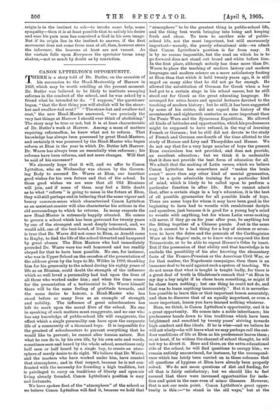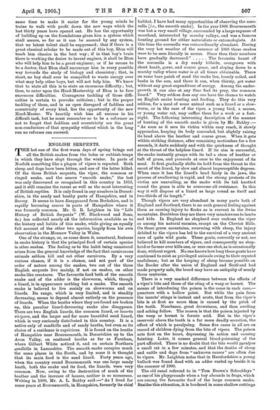We sincerely hope that it will, and we offer to
Canon Lyttelton, who on Wednesday was chosen by the Govern- ing Body to succeed Dr. Warre at Eton, our heartiest good wishes for his own future and that of the school. In those good wishes we are sure that all Old Etonians will join, and if some of them may feel a little doubt as to what " reform " is going to mean in the future at Eton, they will still perhaps end in believing that the same vigour and breezy common-sense which characterised Canon Lyttelton as an assistant-master will also characterise his actions in the old surroundings to which he returns. In many respects the new Head-Master is extremely happily situated. He comes to govern a school which has been governed for twenty years by one of the strongest and most deeply honoured, and, we would add, one of the best-loved, of living schoolmasters. It is true that Dr. Warre did not come to Eton, as Arnold came to Rugby, to find the life of the school thwarted and hampered by great abuses. The Eton Masters who had immediately preceded Dr. Warre were too well honoured and too readily obeyed for that to have been possible. No one, for instance, who was in Upper School on the occasion of the presentation of the address given by the boys to Mr. Wilder in 1889, thanking him for his generosity to the school during his eighty years of life as an Etonian, could doubt the strength of the influence which so well loved a personality had had upon the lives of all those who worked under him ; and when the time comes for the presentation of a testimonial to Dr. Warre himself there will be the same feeling of gratitude towards, and the same desire to honour, a Head-Master who has stood before so many lives as an example of strength and nobility. The influence of great schoolmasters has left its mark upon the moral fibre of the school No one in speaking of such matters must exaggerate, and no one who has any knowledge of public-school life will exaggerate, the effect which a single personality can have upon the corporate life of a community of a thousand boys. It is impossible for the greatest of schoolmasters to prevent everything that he would like to prevent; he cannot alter human nature. But what he can do is, by his own life, by his own acts and words, sometimes seen and heard by the whole school, sometimes only half seen or half heard by a single boy, to create an atmo- sphere of manly desire to do right. We believe that Dr. Warre, and the masters who have worked under him, have created that atmosphere; and in that respect, because he is not con- fronted with the necessity for founding a high tradition, but is privileged to carry on traditions of liberty and open-air living already founded, Canon Lyttelton's position is easy and fortunate.
We have spoken first of the "atmosphere" of the school as we believe Canon Lyttelton will find it, because we hold that "atmosphere" to be the greatest thing in public-school life, and the thing best worth bringing into being and keeping fresh and clean. To turn to another side of public- school life, not the most important, but still enormously important—namely, the purely educational side—we admit that Canon. Lyttelton's position is far from easy. It is by no means impossible, but the road on which he is to go forward does not stand out broad and white before him. In the first place, although nobody has done more than Dr. Warre to place the teaching of modern history and modern languages and modern science on a more satisfactory footing at Eton than that which it held twenty years ago, it is still urged on many sides that he did not go far enough. He allowed the substitution of German for Greek when a boy had got to a certain stage in his school career, but he still stood out for Greek as the great educating language. He arranged for extra hours and special lectures devoted to the teaching of modern history; but he still, it has been suggested by some of his critics, did not regard the history of the seventeenth and eighteenth centuries as more important than the Punic Wars and the Syracusan Expedition. He allowed all kinds of latitudes and opportunities, which his predecessors might be supposed to have refused, in the way of learning French or German ; but he still did not devote to the study of French and German one-fourth of the time allotted to the study of Horace and Livy and Thucydides and Homer. We do not say that for a very large number of boys the present Eton curriculum has not provided, and does not provide, an excellent education; but we think it is undeniable that it does not provide the best form of education for all We admit that the making of Latin verses, which we believe Canon Lyttelton has somewhere said "makes the brain sweat" more than any other kind of mental gymnastics, may be a quite admirable training for a particular kind of mind, which is likely to be called upon to perform a particular function in after life. But we cannot admit that, after a certain stage in a boy's education, it is the best of all possible gymnastics for all possible kinds of boys. There are some boys for whom it may have been good in the beginning to have had to wrestle with recalcitrant dactyls and spondees, just because it is good for a young boy's mind to wrestle with anything, but for whom Latin verse-making will never, if they go on for year after year, be anything but the fitting together of a Chinese puzzle. Just in the same way, it cannot be a bad thing for a boy of sixteen or seven- teen to have the dates and the generals of the Carthaginian Wars at his fingers' ends, or to know who composed the first Triumvirate, or to be able to repeat Horace's Odes by heart. But if the possession of that ability and that knowledge is to exclude the possibility of his also knowing the elementary facts of the Franco-Prussian or the American Civil War, or for that matter, the Napoleonic campaigns, then there is an immense deal to be said against such a system of teaching. We do not mean that what is taught is taught badly, for there is a great deal of truth in Gladstone's remark that "at Eton in my day a boy might if he chose learn something, or might if he chose learn nothing; but one thing he could not do, and that was to learn anything inaccurately." But it is neverthe- less possible to learn this or that important lesson accurately, and then to discover that of an equally important, or even a more important, lesson you have learned nothing whatever.
Here, we think, is Canon Lyttelton's opportunity, and it is a great opportunity. He comes into a noble inheritance; his predecessor hands down to him traditions which have been brightened and ennobled by twenty years' striving towards high conduct and fine ideals. If he is wise—and we believe he will act wisely—he will leave what we may perhaps call the out- door conditions of life at Eton as his predecessor leaves them ; or, at least, if he widens the channel of school thought, he will not try to divert it. Here and there, on the extra-educational side of the school, he will find questions to occupy him ; we remain entirely unconvinced, for instance, by the correspond- ence which has lately been carried on in these columns that all questions of hygiene at Eton have already been properly solved. We do not mean questions of diet and feeding, for all that is fairly satisfactory; but we should like to feel assured that there were increased opportunities for isola- tion and quiet in the case even of minor illnesses. However, that is not our main point. Canon Lyttelton's great oppor- tunity is this :—" to stand in the old ways," but at the same time to make it easier for the young minds he trains to walk with profit down the new ways which the last thirty years have opened out. He has the opportunity of building up on the foundations given him a system which shall assure, so far as it can be assured by any system, that no latent talent shall be suppressed; that if there is a great classical scholar to be made out of this boy, Eton will teach him classics in the best way ; if in that boy's brain there is working the desire to invent engines, it shall be Eton who will help him to be a great engineer; or if he means to be a doctor, that Eton shall encourage him in every possible way towards the study of biology and chemistry ; that, in short, no boy shall ever be compelled to waste energy over what may help other boys, but will not help him. We know that to state all this is to state an enormous difficulty ; but, then, to enter upon the Head-Mastership of Eton is to face enormous difficulties. Courageous tackling of those diffi- culties is certain to provoke criticism ; but in the proper tackling of them, and in an open disregard of faddism and eccentricity of every kind, lies the opportunity of the new Head-Master. We heartily wish him all success in his difficult task, but he must remember so to be a reformer as not to forget that faddism and eccentricity are the great non-conductors of that sympathy without which in the long run no reforms can succeed.











































 Previous page
Previous page